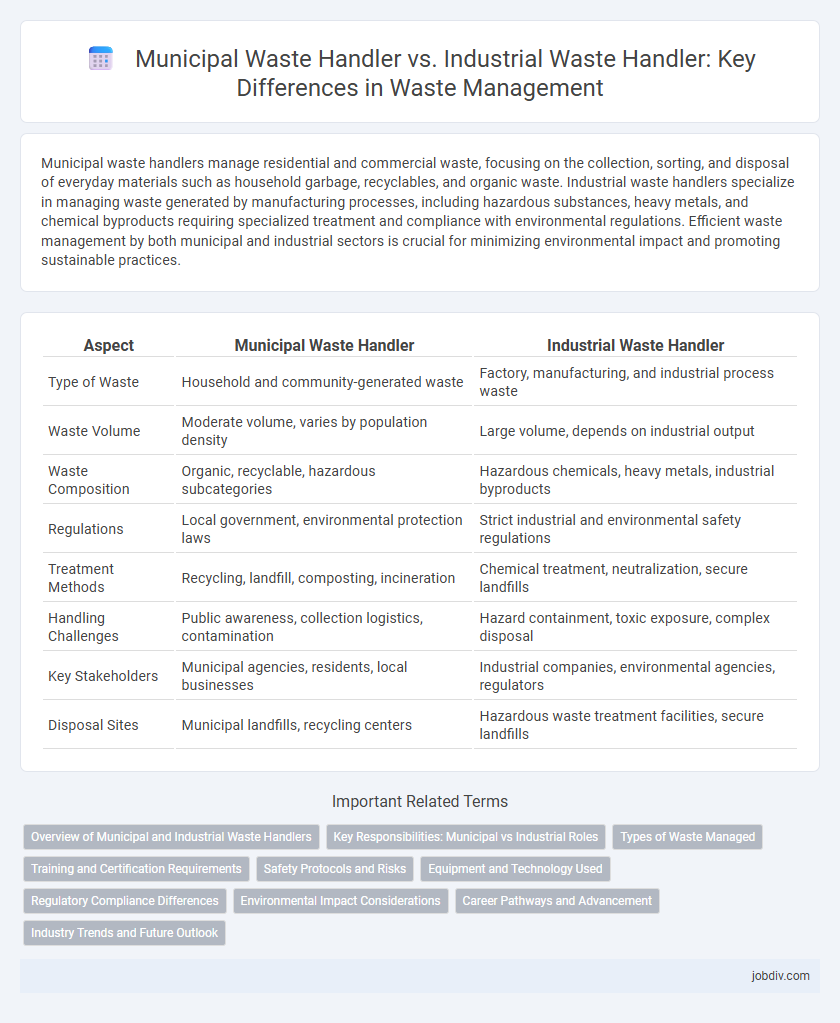Municipal waste handlers manage residential and commercial waste, focusing on the collection, sorting, and disposal of everyday materials such as household garbage, recyclables, and organic waste. Industrial waste handlers specialize in managing waste generated by manufacturing processes, including hazardous substances, heavy metals, and chemical byproducts requiring specialized treatment and compliance with environmental regulations. Efficient waste management by both municipal and industrial sectors is crucial for minimizing environmental impact and promoting sustainable practices.
Table of Comparison
| Aspect | Municipal Waste Handler | Industrial Waste Handler |
|---|---|---|
| Type of Waste | Household and community-generated waste | Factory, manufacturing, and industrial process waste |
| Waste Volume | Moderate volume, varies by population density | Large volume, depends on industrial output |
| Waste Composition | Organic, recyclable, hazardous subcategories | Hazardous chemicals, heavy metals, industrial byproducts |
| Regulations | Local government, environmental protection laws | Strict industrial and environmental safety regulations |
| Treatment Methods | Recycling, landfill, composting, incineration | Chemical treatment, neutralization, secure landfills |
| Handling Challenges | Public awareness, collection logistics, contamination | Hazard containment, toxic exposure, complex disposal |
| Key Stakeholders | Municipal agencies, residents, local businesses | Industrial companies, environmental agencies, regulators |
| Disposal Sites | Municipal landfills, recycling centers | Hazardous waste treatment facilities, secure landfills |
Overview of Municipal and Industrial Waste Handlers
Municipal waste handlers manage household refuse, street litter, and commercial waste, focusing on collection, transportation, and disposal within urban areas to maintain public health and sanitation. Industrial waste handlers deal with byproducts from manufacturing processes, including hazardous materials requiring specialized treatment and compliance with environmental regulations to prevent contamination. Both sectors employ distinct technologies and protocols tailored to the waste type, volume, and regulatory frameworks governing environmental safety.
Key Responsibilities: Municipal vs Industrial Roles
Municipal waste handlers specialize in collecting, transporting, and processing residential and commercial waste from urban areas, ensuring safe disposal and recycling to maintain public health. Industrial waste handlers focus on managing hazardous and non-hazardous waste generated by manufacturing and industrial facilities, adhering to strict regulatory compliance for environmental protection. Both roles require expertise in waste segregation, treatment technologies, and adherence to local and federal waste management regulations.
Types of Waste Managed
Municipal waste handlers primarily manage household waste, organic materials, recyclables, and bulky items generated by residential and commercial sources. Industrial waste handlers focus on hazardous waste, chemical by-products, heavy metals, and non-biodegradable materials produced by manufacturing plants and industrial processes. Effective waste management requires tailored techniques to address the specific composition and risks associated with each waste type.
Training and Certification Requirements
Municipal waste handlers typically require training in public health regulations, hazardous material handling, and local government compliance standards, often certified through municipal or regional environmental agencies. Industrial waste handlers must undergo specialized training focused on managing chemical, toxic, and hazardous waste, usually obtaining certifications such as OSHA HAZWOPER (Hazardous Waste Operations and Emergency Response) to meet stringent federal regulations. Both roles demand ongoing education to stay current with waste management technologies, safety protocols, and legal requirements specific to their operational environments.
Safety Protocols and Risks
Municipal waste handlers follow strict safety protocols involving PPE, regular training on hazardous materials, and adherence to local regulations to manage risks associated with household and commercial waste. Industrial waste handlers face higher risks due to chemical, biological, and flammable materials, requiring advanced safety measures such as specialized containment, real-time monitoring systems, and compliance with OSHA standards. Both sectors prioritize risk reduction but industrial waste management demands more rigorous protocols to prevent accidents, contamination, and environmental hazards.
Equipment and Technology Used
Municipal waste handlers commonly utilize residential garbage trucks, automated collection systems, and street sweepers designed for mixed household waste and recyclables, emphasizing compacting and sorting technologies. Industrial waste handlers employ specialized machinery such as heavy-duty shredders, stationary compactors, and chemical treatment equipment to manage hazardous, bulky, and process-specific industrial byproducts. Advanced technologies like GPS-enabled fleet tracking and IoT sensors optimize route efficiency and real-time monitoring for both municipal and industrial waste management operations.
Regulatory Compliance Differences
Municipal waste handlers primarily adhere to local and state regulations that govern household and commercial waste collection, focusing on compliance with municipal solid waste rules and recycling mandates. Industrial waste handlers must comply with stringent federal regulations such as those outlined in the Resource Conservation and Recovery Act (RCRA), which addresses hazardous waste management, treatment, and disposal. The regulatory framework for industrial waste handlers involves detailed reporting, permits, and safety protocols due to the potential environmental hazards associated with industrial waste streams.
Environmental Impact Considerations
Municipal waste handlers primarily manage household and community-generated refuse, focusing on reducing landfill use and promoting recycling to minimize urban environmental footprints. Industrial waste handlers deal with hazardous and non-hazardous waste from manufacturing processes, requiring stringent treatment and disposal methods to prevent soil, air, and water contamination. Environmental impact considerations emphasize tailored waste segregation, regulatory compliance, and advanced treatment technologies to mitigate pollution risks associated with each waste type.
Career Pathways and Advancement
Municipal waste handlers typically follow career pathways centered on public sanitation roles, progressing from collection operatives to supervisory positions within city or county waste management departments. Industrial waste handlers often advance through specialized training in hazardous materials management, moving into compliance officer or environmental safety manager roles within manufacturing or chemical industries. Both pathways offer opportunities for advancement through certifications such as OSHA training or hazardous waste operations and emergency response (HAZWOPER) credentials, enhancing job prospects and earning potential.
Industry Trends and Future Outlook
Municipal waste handlers are increasingly adopting smart waste management technologies such as IoT-enabled bins and automated sorting systems to enhance efficiency and reduce landfill dependency. Industrial waste handlers are focusing on sustainable practices, including waste-to-energy conversion and advanced recycling methods, driven by stricter environmental regulations and corporate sustainability commitments. Emerging trends indicate a convergence of digital solutions and circular economy principles, positioning both sectors for significant innovation and growth over the next decade.
Municipal Waste Handler vs Industrial Waste Handler Infographic

 jobdiv.com
jobdiv.com